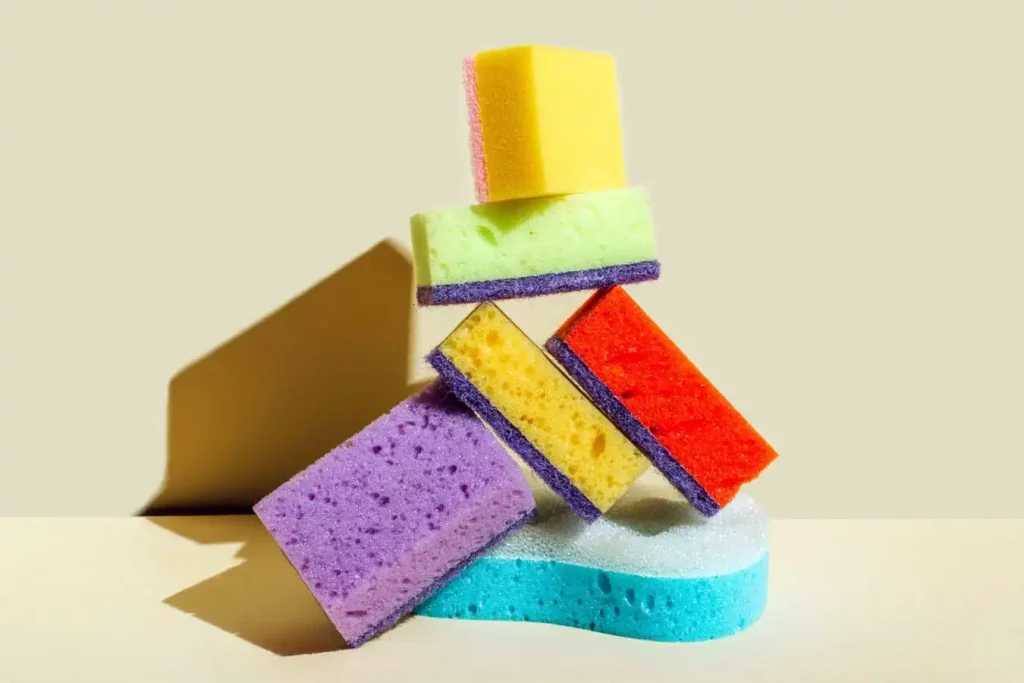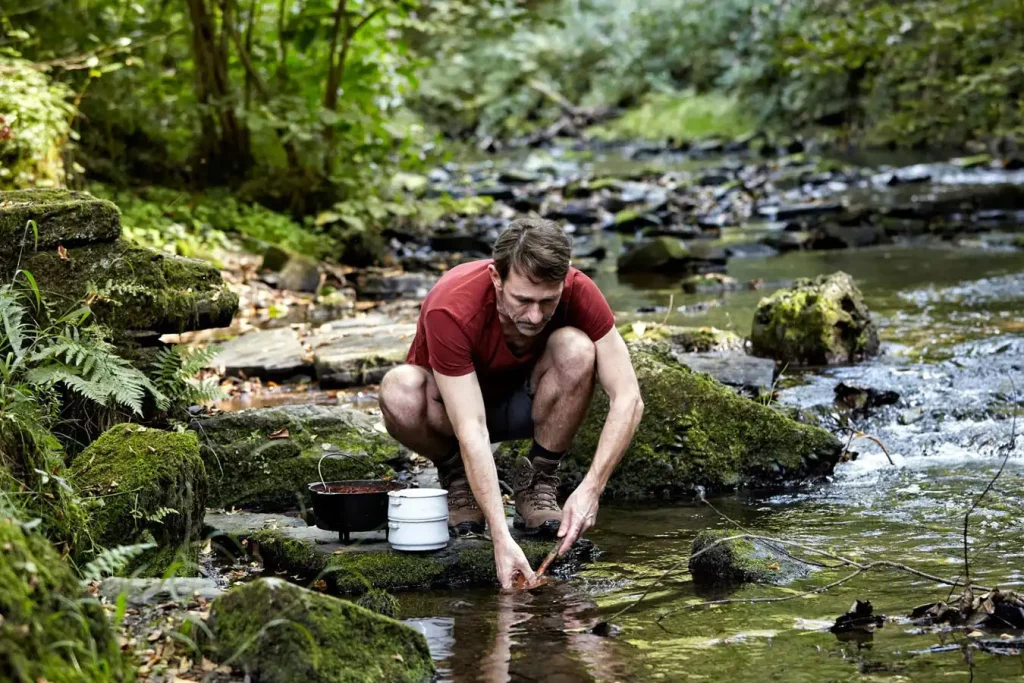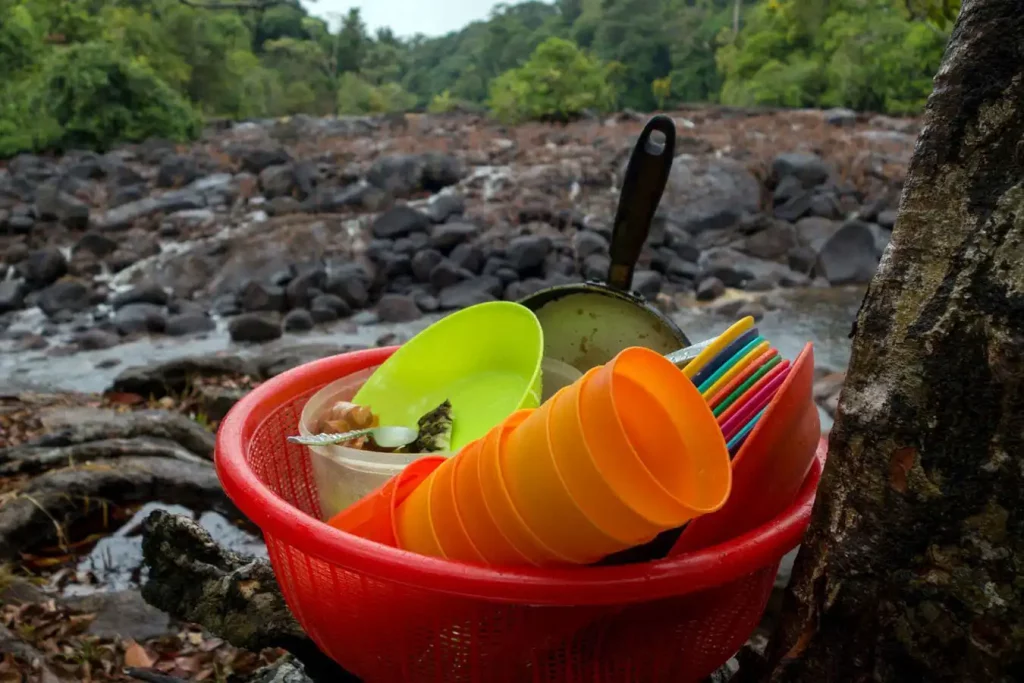Learning “how to wash dishes while camping” is an essential yet often overlooked skill for any outdoor adventurer.
Who wants to eat off a dirty plate or see last night's dinner in their morning oatmeal?
Let's dive into some handy tips that’ll have you cleaning up like a pro, even miles from the nearest kitchen.
Preparing for the Campsite
Before you find yourself in the heart of nature, it's important to plan your dishwashing strategy. Like a well-packed backpack, a well-prepared plan will make your camping experience smooth and enjoyable.
What You Need to Pack
Start with packing the essentials. Remember, we want to be efficient, eco-friendly, and lightweight.
- Biodegradable Soap: Regular dish soap can harm the environment. Opt for a biodegradable one which is friendly to flora and fauna.
- Dish Tub: A collapsible one is a great option. It's lightweight and takes less space.
- Scrub Brush or Sponge: Choose something non-abrasive that won't scratch your dishes.
- Microfiber Towel: Quick-drying and lightweight, it's a camper's best friend.

Remember the rule of thumb: less is more. Pack light, but make each item count.
Setting Up Your Campsite Dishwashing Station
Once at the campsite, it's time to set up your dishwashing station. Consider these steps:
- Select a Spot: Choose a location at least 200 feet away from any water bodies to prevent contamination.
- Organize Your Space: Arrange your dishwashing essentials. Set up your tub, keep your soap and scrub within reach.
- Water Source: If there's a water supply at the campsite, great. If not, fetch water from a nearby source and boil it for safety.
By taking the time to set up an efficient dishwashing station, you make the process less of a chore and more a part of the unique camping experience.
Camping is not just an escape from the hustle and bustle of city life. It's also a journey of discovery, survival, and connection with nature. By adopting eco-friendly practices like washing dishes responsibly, we ensure our beloved outdoors remain pristine for generations to come. Remember, we're not just campers, we're also stewards of Mother Nature.
How to Wash Dishes While Camping: Step-by-Step Process
No more muddy water, soap-streaked plates, or food residues! Let's dive into the simple yet effective steps to getting those dishes clean in the wilderness.
Step 1: Scraping and Pre-rinsing the Dishes
Scraping off food waste is essential in the wild. You see, leftover food scraps attract unwanted guests like ants, raccoons, or even bears. Plus, it makes the washing process easier and more water-efficient. Use a biodegradable scraper or just the good ol' spatula to scrape off food remains.

Next up, pre-rinsing. If you've cooked something greasy, a quick pre-rinse will go a long way. Use minimal water to rinse off the loose dirt. Remember, we're in the wilderness, every drop of water counts!
Step 2: Washing the Dishes
Now to the main event – washing. Fill your tub with warm water and a few drops of your biodegradable soap. Scrub each dish thoroughly, ensuring all food particles and grease are gone. Rotate your dishes in the soapy water; start with the least dirty, and end with the cookware or heavily soiled dishes.
And here's a pro-tip – always keep a check on water and soap use. It's tempting to pour in a bit more soap for those stubborn stains, but resist the urge. You'd be surprised at how effective a little can be!
Step 3: Rinsing and Sanitizing the Dishes
Thorough rinsing and sanitizing is key to food safety while camping. Rinse your dishes in clean, warm water, ensuring all soap suds are gone. For sanitation, you can boil water and give your dishes a final dip or use sanitizing tablets as per instructions. This step removes any remaining bacteria and ensures your dishes are safe for the next meal.
Step 4: Drying the Dishes
Finally, we're on to drying. You've got two great options here. Air-drying is the easiest and most eco-friendly. Just set your dishes on a clean, dry towel, and let nature do its thing. If time or weather isn't in your favor, use a microfiber towel to dry your dishes. Remember to make sure the towel is clean to prevent bacteria growth.
So, there you have it, folks, the art of washing dishes while camping. It's simple, eco-friendly, and ensures we leave no trace behind. After all, camping is about enjoying and preserving the beauty of the great outdoors, isn't it?
Proper Disposal of Dishwashing Water
Let's be honest, disposal of dishwater might not be the first thing that comes to mind when planning a camping trip. Yet, it's an integral part of our responsibility towards the environment. So, let's talk about why and how we can do it right.
Leave No Trace: Environmental Impact of Improper Waste Disposal
Dumping dishwater carelessly can have serious implications for our environment. It may seem harmless to empty your tub into the bushes, but this small act can disrupt the ecosystem. Food scraps can attract wildlife, alter their natural behavior, and even harm them. In addition, soap, even the biodegradable kind, can harm plant life and contaminate water sources.
Ever heard of the “Leave No Trace” camping ethics? Well, it's all about respecting and preserving the wilderness. It involves seven principles, one of which is disposing of waste properly. And that includes our dishwater.
How to Properly Dispose of Dishwater While Camping
Now that we understand why proper disposal is crucial, let's see how we can do it.
- Strain it: Start by straining the dishwater. Use a small strainer or a piece of cloth to separate food particles. Remember to pack out the food scraps with your trash.
- Dig a hole: Dig a small cathole about 6 to 8 inches deep and at least 200 feet away from any water source. This prevents any contamination of the water bodies and reduces the chance of attracting wildlife to your campsite.
- Scatter it: Slowly scatter the strained water in the hole. The aim is to spread it over a broad area, allowing the soil and vegetation to filter it naturally.
- Cover it up: Finally, cover up the hole with the original dirt and leaf litter.
There you have it – a responsible way to deal with dishwater at a campsite. Yes, it requires a little extra effort, but it's a small price to pay to keep our beautiful outdoors pristine. Happy camping, folks!
Expert Tips and Tricks for Efficient Dishwashing While Camping
After mastering the basics, it's time to up your dishwashing game with some expert tips and tricks. As a seasoned camper, I've found these techniques particularly helpful in making the dishwashing process quicker, easier, and more efficient. Let's dive in!
- Double Up on Utensils: Consider packing duplicates of certain utensils like spatulas or spoons. This way, you can easily switch out a dirty utensil without having to stop and clean it mid-cooking.
- Pre-clean with Paper Towels: Before rinsing your dishes, wipe them down with a paper towel. This helps to remove excess grease and makes the washing process smoother. Don't forget to pack the used paper towels with your trash.
- Use a Dish Tub: A small, portable dish tub can make washing dishes a breeze. It can hold your dirty dishes, serve as a rinsing station, and even store your clean dishes afterward.
- Boil Water for Sanitizing: Boil some water and let your dishes soak in it for a few minutes. The heat kills off any bacteria, ensuring your dishes are not just clean but sanitized.
- Dry Dishes in the Sun: If it's a sunny day, make the most of it by air-drying your dishes in the sun. The UV rays from the sun also help in killing bacteria.
To know more: How to Clean a Tent for Camping
FAQs about Wash Dishes While Camping
What is the best way to clean dishes while camping?
Where do you wash dishes at a campsite?
What is the 3 bucket wash method camping?
Can you use Dawn dish soap when camping?
Is the 2 bucket wash method necessary?
What is the 2 bucket cleaning method?
Final Words for Wash Dishes While Camping
Keeping your dishes clean while camping is not just about maintaining a pleasant campsite but also about ensuring your health and safety. It's about respecting the great outdoors and leaving as little impact as possible. With these tips and tricks in your back pocket, dishwashing at a campsite doesn't have to feel like a chore.
As a passionate camper, I've learned that the essence of camping lies in the delicate balance of enjoying the wild while preserving it. Remember, the smell of the campfire smoke and the taste of camp foods become more rewarding when we know we've done our part in taking care of our temporary home in the wild. Here's to clean dishes and cleaner campsites!
As always, I'm Ovi Tanchangya, and it's my mission to make your camping experience as enjoyable and responsible as possible. Happy camping, everyone!


